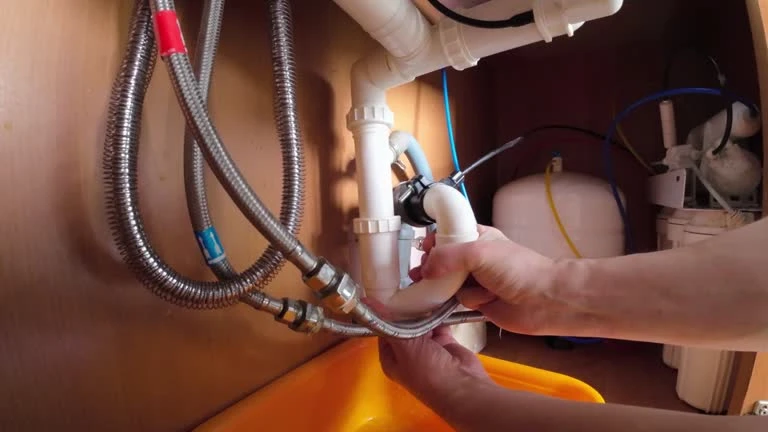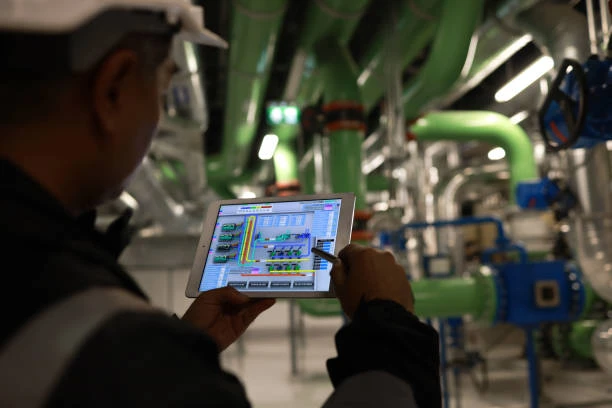Introduction to Ball Valves in Chemical Processes
Ball valves are widely used in chemical processes for their reliability and versatility. These valves control the flow of liquids, gases, and chemicals in pipelines, reactors, and other essential systems. The design of a ball valve features a spherical ball with a hole in the center. When the valve turns, it either allows or restricts the flow. In chemical processes, these valves ensure accurate fluid control, prevent leaks, and provide ease of maintenance. Among the different types of ball valves, the 3-way ball valve stands out for its ability to control the flow in multiple directions. This versatility makes it a critical component in various chemical process applications.
Key Types of Ball Valves Used in Chemical Industries
Several types of ball valves are used in the chemical industry, each designed to serve specific functions. The most common include floating ball valves, trunnion-mounted ball valves, and 3-way ball valves. Floating ball valves are ideal for low-pressure applications and are widely used for on/off flow control. Trunnion-mounted ball valves are more suitable for high-pressure systems due to their stability and durability. The 3-way ball valve is particularly important for applications requiring the redirection of flow in three different paths. This design allows for versatile fluid distribution, often used in mixing, diverting, and combining different chemical streams in a system. Its adaptability makes the 3-way ball valve a preferred choice in many chemical processes.
Advantages of Using Ball Valves for Flow Control
Ball valves offer significant advantages when it comes to flow control in chemical processes. Their primary benefit lies in their ability to provide tight sealing, ensuring that no leaks occur during operation. This is especially important in chemical processes where preventing contamination and maintaining system integrity are critical. Ball valves are also easy to operate, offering quick and efficient flow regulation. The 3-way ball valve enhances this capability by allowing for the control of multiple flow paths simultaneously, making it ideal for complex chemical processing systems. Its simple design also means less maintenance, reducing downtime and operational costs in industrial settings.
Reliability and Safety of Ball Valves in Harsh Environments
Chemical processes often involve hazardous substances and extreme operating conditions. Ball valves, particularly the 3-way ball valve, are built to withstand these challenges. These valves provide superior performance even in high-pressure, high-temperature, or corrosive environments. Their durable construction and robust sealing capabilities make them an excellent choice for chemical industries where safety and reliability are paramount. For example, in the petrochemical industry, ball valves regulate the flow of highly corrosive chemicals, preventing leaks and ensuring the safety of workers and equipment. Their ability to endure harsh chemicals and extreme conditions ensures long-lasting performance and reduces the risk of catastrophic failures.
Efficiency and Precision in Chemical Process Control
Ball valves are known for their precise flow control capabilities. The 3-way ball valve, in particular, is essential for applications that require accurate regulation of fluid flow in multiple directions. This valve type allows operators to mix, divert, or isolate fluid streams with high precision, improving the efficiency of the chemical process. For example, in a chemical mixing system, the 3-way ball valve can help combine two or more chemical inputs at the right proportions, ensuring a consistent and accurate mixture. This precision is critical in industries such as pharmaceuticals, where the exact chemical composition is essential for product quality.
Cost-Effectiveness of Ball Valves in Chemical Operations
One of the key advantages of using ball valves in chemical operations is their cost-effectiveness. Ball valves, including 3-way ball valves, offer long-term reliability and durability, reducing the need for frequent replacements. Their simple design also ensures ease of maintenance, which minimizes downtime and labor costs. Compared to other valve types, ball valves are often less expensive to install and maintain, making them a popular choice in cost-sensitive chemical industries. The ability to control multiple flow paths with a single 3-way ball valve further reduces equipment costs by minimizing the number of valves required in a system. This makes ball valves a highly cost-effective solution for many chemical process applications.
Versatility and Adaptability of 3-Way Ball Valves
The 3-way ball valve’s versatility makes it an indispensable tool in various chemical processes. These valves can be configured to allow for different flow paths, such as mixing, diverting, or isolating fluids. This adaptability is crucial in chemical processes where multiple fluids need to be combined or separated. In industries like water treatment, food processing, and chemical manufacturing, the 3-way ball valve enables precise flow control for complex applications. The valve’s ability to handle both high and low pressures further expands its versatility. Operators can use a 3-way ball valve to manage the flow of different chemicals or solutions, optimizing the overall process without needing additional valves.
Maintenance and Longevity of Ball Valves
Ball valves, including the 3-way ball valve, are designed for minimal maintenance while offering long service lives. Their durable construction ensures that they can withstand the wear and tear of continuous operation in chemical environments. Regular maintenance typically involves checking for wear on the seats and ball, lubricating moving parts, and inspecting seals. The 3-way ball valve, with its simple design and few moving parts, is particularly easy to maintain. This reduces the need for specialized labor and costly repairs. Additionally, the longevity of ball valves contributes to reduced downtime and long-term savings for chemical plants. Reliable performance over time makes ball valves a preferred option for industries looking to improve operational efficiency.
Future Trends in Ball Valve Technology for Chemical Processes
The future of ball valve technology in chemical processes looks promising, with continued innovations in materials, design, and functionality. Advances in corrosion-resistant materials will enhance the lifespan and performance of ball valves in challenging chemical environments. Furthermore, the integration of automation and smart technology into ball valves will provide real-time monitoring and control, improving process efficiency and safety. The 3-way ball valve, in particular, will benefit from these developments, offering even more precise flow control and greater flexibility. As industries seek more efficient, cost-effective, and sustainable solutions, ball valve technology will continue to evolve to meet these demands, solidifying its role in chemical process control.
Conclusion
Ball valves, especially 3-way ball valves, offer numerous advantages in chemical processes. Their ability to provide precise flow control, reliable sealing, and ease of maintenance makes them essential in a wide range of industries. Whether used for mixing, diverting, or isolating chemical streams, 3-way ball valves enhance the efficiency and safety of chemical operations. The durability and cost-effectiveness of these valves contribute to long-term savings and reduced operational risks. As technology continues to advance, the role of ball valves in chemical processes will only grow, ensuring that they remain a crucial component in the efficient and safe operation of chemical plants worldwide.
IFAN Products international standards
IFAN products strictly adhere to a comprehensive range of international standards, encompassing ISO 15874, EN 15874, ASTM F2389, DIN 8077/8078, GB/T 18742, NBR 15884, ISO 15494, EN ISO 15494, GB/T 19472, NBR 15494, ASTM 2846 (501), DIN 8079/8080 (502), ASTM F441/F441M SCH80 (503), DIN (504), DIN (505), GB/T 18993, AS/NZS 1477, CSA B137.6, NSF/ANSI 14, TIS 17-2532/1131-2535, BS 3505, BS 4346 (801), ASTM D1785 SCH40 (802), ASTM D1785 SCH80 (803), DIN (804), GB (805), GB (806), GB(901), DWV(902), ASTM D2665 (903), along with ASTM D2241, D2665, D2729, and F441/F441M series, ISO 1452, EN ISO 1452, DIN 8061/8062, GB/T 10002, AS/NZS 1477, JIS K6741, CSA B137.3, and other national and industry norms.
Connect
IFAN is a Chinese manufacturer of plastic pipes, fittings and valves with 30 years of experience. If you are interest in IFAN copper fittings, copper valves, plastic pipes and fittings, please contact us. IFAN offers you a variety of standard pipes to meet your specific needs. Click below to learn more about IFAN’s wide range of affordable and cost-effective valve products and piping system related products.
We will reply your email or fax within 24 hours.
You can call us at any time if there is any question on our production.
For more information,pls visit our webside https://waterpipefitting.com/
Pls Mailto: [email protected]
Whatsapp: +86 15088288323The 3-way ball valve offers precise flow control, versatility, and reliability in chemical processes, enhancing efficiency and safety in various industrial applications.














Recent Comments